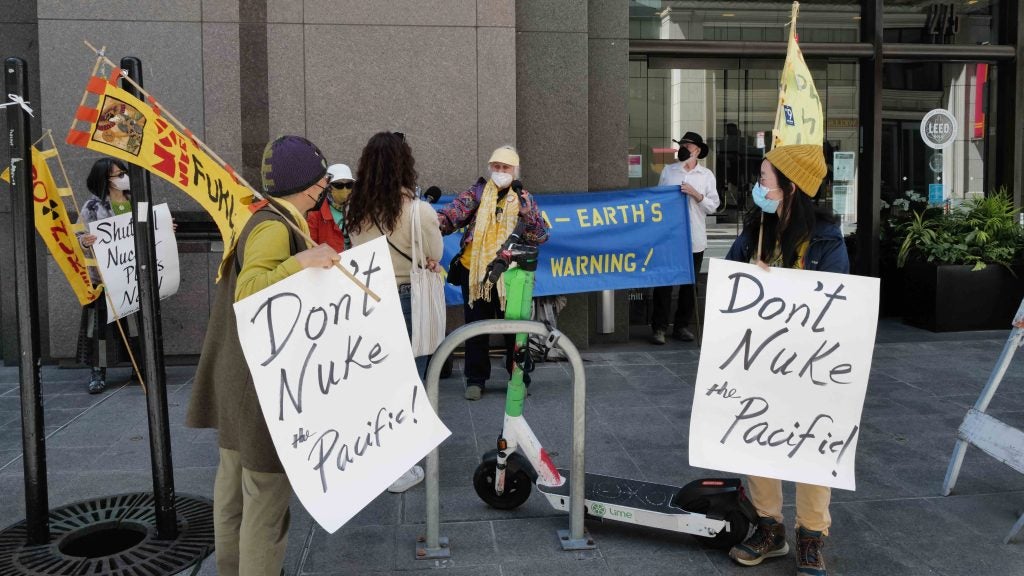A team of international scientists collected samples of fish from the Hisanohama port on Thursday (19 October), approximately 50km south of the site of the ruined Fukushima Daiichi nuclear power plant, from which wastewater is being released.
The site closed in 2011 after a major earthquake and 15m tsunami caused the level 7-rated accident, which saw all four reactors written off.
On 24 August this year, Japan undertook its first discharge of treated wastewater from the Fukushima site, a move that drew criticism from local fishermen and prompted China and more recently Russia to ban all seafood and marine products from Japan, citing concerns over food safety.
According to the International Atomic Energy Agency (IAEA), the team included experts from laboratories in China, South Korea and Canada, as well as two staff from the IAEA’s own laboratories in Monaco. It reported that the team would be working from 16-23 October and would also be sampling fish from markets in the Fukushima Prefecture.
It stated: “The Agency’s samples will be used to corroborate Japan’s environmental monitoring and to assess the country’s relevant technical capabilities.”
Japan has been quick to emphasise the safety of its seafood, with the government posting this week about the Sakana and Japan Festival, which resumed in 2023 after facing three years of cancellations during the pandemic.
The @37Sakana_JAPAN project supports the revitalization of Fukushima's fishing and seafood 🐟 industry! It promotes the prefecture's quality products & provides chances to taste them at events like the SAKANA & JAPAN FESTIVAL 2023.https://t.co/9v46hR5JWu#RegionalRevitalization pic.twitter.com/fwYZGQUvae
— The Gov't of Japan (@JapanGov) October 19, 2023
The festival is run by the Sakana and Japan Project, which is currently running a project named “Let’s eat Fukushima fish,” which includes a seafood cooking competition.
今年も開催!『第24回 シーフード料理コンクール』
— sakanajapanproject🐟 (@37Sakana_JAPAN) August 1, 2023
テーマは「みんなでうお活 ~おいしくてごめん~」
応募された方の中から抽選で10名様に、
JFおさかなマルシェ ギョギョいちより、おいしい水産物のプレゼントも!https://t.co/aY8IBqYKPQ#シーフード料理コンクール #全漁連 #さかなクン pic.twitter.com/iTPU7DEK6b
However, there has been scepticism from users of X (formerly Twitter) across the globe, who have taken to the platform to share their concerns. One user posted her discomfort with the phrase used to describe tritium (the radioactive isotope of hydrogen) in the Reuters report.
"...is considered to be relatively harmless" may be one of the more unsettling statements ever made.
— Fiona Kenny (@fionakennyantiq) October 19, 2023
Scientists test Fukushima fish after nuclear plant water release https://t.co/fRYu6rHMQr
Another commented on The Japan Times’ post about the Ikejime fishing method.
Fish from waters freshly polluted by radioactive discharge from #fukushima ?
— polyp2000(⧖) +2°c = CORAL REEF EXTINCTION (@polyp2000) October 20, 2023
Over a million metric tons of water was contaminated from contact with fuel rods at Fukushima. Before release, it is filtered using an Advanced Liquid Processing System (ALPS), which removes 62 radionuclides through a series of chemical reactions, according to the IAEA. However, the system is not able to remove tritium, which can only be recovered when it is highly concentrated in small amounts of water.
The contaminated water has previously been treated and stored at the Fukushima Daiichi site, which has roughly 1,000 tanks. However, the volume of water needing to be stored has been increasing, and the tanks are nearing capacity.
To resolve the issue, the water is diluted to one 40th of the concentration permitted by Japanese safety standards, before being released into the sea. The release will occur gradually over the next 30 to 40 years.
Our signals coverage is powered by GlobalData’s Thematic Engine, which tags millions of data items across six alternative datasets — patents, jobs, deals, company filings, social media mentions and news — to themes, sectors and companies. These signals enhance our predictive capabilities, helping us to identify the most disruptive threats across each of the sectors we cover and the companies best placed to succeed.









